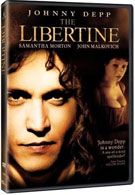With Johnny Depp in a movie, the audience is assured of one thing: the film will never becoming boring. With a simple roll of the eyes or quirk of the brow, he expresses so much with so little, captivating as easily as the rest of us mere mortals draw breath. Given Depp’s large female (and many males as well, I suspect) fanbase, a movie with the tagline “he didn’t resist temptation… he pursued it”, seems at first glance to be pure fanservice. The Libertine, similar to its subject of John Wilmot, aka Earl of Rochester, allows the deception until the first few frames, in which the Earl himself informs us that we will not like him, even as we sigh with lust.
Ironically, he is quite wrong. The story draws us into the final years of his life, when he is returning from yet another exile by King Charles II (John Malkovich). The King commissions a play from Wilmot, hoping such a display of genius will convince France to give Charles II support. All of this goes in one ear and out the other with Wilmot – quite apparent during a scene between the two, with thirty seconds passing before Wilmot realizes the conversation is over – since he’s distracted with a new amateur theatre actress, Elizabeth Barry (Samantha Morton).
Over half of the film is as the audience expects, with Wilmot numbing his genius and pain with drink and empty, joyless sex, often destroying his work as much as he destroys himself. The results of such a lifestyle are explored within the final act, each reveal of Depp’s decaying face as a result of syphilis more cringe-worthy than the one before. It is at such a level of weakness and despair that Depp is at his finest, rendering this reviewer stunned and speechless for many of his scenes.
The end of the film, without spoiling anything, brings us back to the beginning, with Depp asking the audience if we like him, now. At first arrogant, the question is repeated, more needy, and then once more, this time confused. We do like him, with his sensual and sinister sexuality, rendering us as baffled as he. Such a small release is given a surprising amount of features. Up first is a 35 minute documentary, covering everything a fan might want to know, from candles to dildos (yes, you read that correctly…) to the difficulties in financing the project, to the choices in make-up and atmosphere. There are interviews with the principal cast, crew, and writer; a very informative piece, overall.
Next is a full-length commentary with director Laurence Dunmore. He speaks in a quiet, kind-of droll tone, yet he’s very engaging with his commitment to the project. He sometimes speaks scene-specific, other times discussing the production and his feelings during filming some emotional scenes. Rounding out the extras are a collection of eight deleted scenes, each one wisely cut, with optional commentary by Dunmore.
Image quality is difficult to judge in a typical manner. A stark contrast to the squeaky-clean period pieces often churned out by Hollywood, the entire film is muted and murky, almost entirely sepia-toned, with primary colors dulled. Often, the scenes are lit only by natural lighting and candles, which casts an eerie, sickly glow over the actors’ skin. Grain is also present, though it’s difficult to say if this a fault of the film stock or it was an intentional choice of style.
Regardless, the heavy earth tones work given the subject matter, with smoke, fog, humid mist, and of course the mud adding atmosphere and depth to 17th century England. The audio, thankfully, comes through clear and crisp, dialogue complimented by a beautiful score. However, I did have to turn on subtitles a few times, though that was more a fault of the accents than the transfer.
The Libertine’s grim depiction of debauched nobility – and the sicknesses which result from such carefree lifestyles – is certainly not for everyone’s taste. I, however, highly recommend it to everyone, particularly all Johnny Depp fans – or at least those mature enough to recognize great acting ability, and not just a pretty face.

The Watchers’ Ishana Night Shyamalan Cited Miyazaki As A Major Influence, And Now I’m Excited For The Movie For A Different Reason

Star Wars’ Daisy Ridley Reveals Challenges To Stepping Back Into Rey Role Years Later

Taylor Swift Called Out Positive Reviewers By Name, After One Negative Review Led Outlet To Hide Theirs Over ‘Threats Of Violence’
Most Popular




